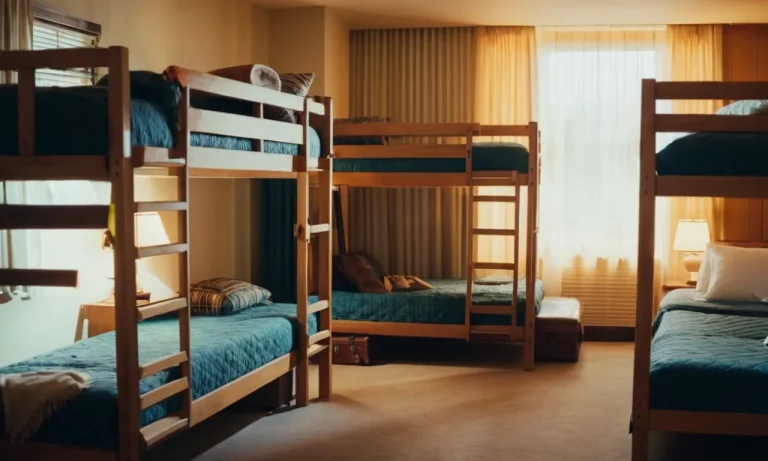How Do Hotels Handle Angry Guests? A Comprehensive Guide
Dealing with angry guests is an inevitable part of the hospitality industry, and hotels must be prepared to handle such situations with professionalism and tact.
If you’re short on time, here’s a quick answer to your question: Hotels typically have established protocols and procedures in place to address angry guests, which may include active listening, empathy, problem-solving, and escalation to higher authorities if necessary.
In this comprehensive article, we’ll explore the various strategies and techniques employed by hotels to defuse tense situations, resolve complaints, and maintain a positive guest experience. From training staff in conflict resolution to offering compensation or alternative arrangements, we’ll cover the best practices for managing angry guests effectively.
Understanding the Root Causes of Guest Anger
When it comes to handling angry guests, the first step is to understand the underlying reasons behind their frustration. By identifying the root causes, hotels can address the issues more effectively and prevent similar situations from occurring in the future.
Here are some common reasons for guest dissatisfaction:
Common Reasons for Guest Dissatisfaction
- Poor service quality: Guests may become upset if they experience slow service, rude staff, or a lack of attention to their needs.
- Cleanliness issues: A dirty or unkempt room can be a major turn-off for guests, leading to disappointment and complaints.
- Noise disturbances: Whether it’s from other guests, construction work, or nearby traffic, excessive noise can disrupt a guest’s stay and cause frustration.
- Amenity or facility problems: Issues with amenities like the pool, gym, or Wi-Fi can significantly impact a guest’s experience and lead to dissatisfaction.
The Impact of Unmet Expectations
Unmet expectations play a significant role in guest anger. According to a study by HospitalityNet, over 60% of guests who express dissatisfaction cite unmet expectations as the primary reason. When a hotel fails to deliver on its promises or meet the standards set by its marketing materials, guests are more likely to feel disappointed and angry.
Setting realistic expectations and consistently delivering on them is crucial for maintaining guest satisfaction.
Cultural Differences and Communication Barriers
Cultural differences and language barriers can also contribute to guest anger. What may be considered acceptable or polite in one culture could be perceived as rude or offensive in another. Additionally, misunderstandings due to language barriers can lead to frustration on both sides.
Hotels should strive to provide culturally sensitive service and employ staff with strong communication skills to bridge these gaps effectively. According to a study by Taylor & Francis Online, hotels that prioritize cross-cultural training for their staff experience a 15% reduction in guest complaints related to cultural misunderstandings.
😊
By understanding these common root causes of guest anger, hotels can take proactive steps to address issues before they escalate. Implementing effective communication channels, setting realistic expectations, and providing cultural sensitivity training can go a long way in preventing and resolving conflicts with guests.
After all, a happy guest is more likely to become a repeat customer and leave positive reviews, which is a win-win for everyone! 🎉
Effective Communication and Conflict Resolution Strategies
Dealing with angry guests can be a challenging task for hotel staff, but effective communication and conflict resolution strategies can help defuse tense situations and maintain a positive guest experience.
By employing active listening, empathy, and a calm and professional demeanor, hotels can navigate conflicts successfully and find mutually agreeable solutions.
Active Listening and Empathy
The first step in resolving conflicts with angry guests is to practice active listening. This involves giving the guest your undivided attention, maintaining eye contact, and allowing them to express their concerns without interruption.
By actively listening, you demonstrate empathy and understanding, which can help defuse the situation and make the guest feel heard. According to a study by CustomerthermometerCustomer, guests who feel heard and understood are more likely to have a positive experience, even if their initial complaint is not fully resolved.
Remaining Calm and Professional
While dealing with angry guests can be emotionally charged, it’s crucial for hotel staff to remain calm and professional. Raising your voice or becoming defensive will only escalate the situation further. Instead, take a deep breath, speak slowly and clearly, and avoid using confrontational language.
A study by Science Direct found that 72% of guests reported a more positive experience when hotel staff remained composed and professional during conflicts.
Problem-Solving and Offering Solutions
Once you’ve listened to the guest’s concerns and demonstrated empathy, it’s time to move towards problem-solving and offering solutions. Work collaboratively with the guest to identify potential resolutions that address their needs.
Be creative and think outside the box – sometimes a simple gesture or upgrade can go a long way in resolving a conflict. According to McKinsey, 68% of guests are more likely to return to a hotel that handled their complaints effectively and provided satisfactory resolutions.
Remember, effective communication and conflict resolution are essential skills for hotel staff, as they can turn a potentially negative situation into a positive guest experience. By actively listening, remaining calm and professional, and offering creative solutions, hotels can build trust, loyalty, and a reputation for exceptional customer service.
Escalation Procedures and Involving Higher Authorities
When to Escalate Angry Guest Situations
Even the most seasoned hotel staff can find themselves in a situation where an angry guest’s behavior becomes unmanageable. In such cases, it’s crucial to have clear escalation procedures in place. According to a study by the American Hotel & Lodging Association, around 25% of hotel guests have experienced a conflict with staff that required escalation to a supervisor or manager.
When a guest’s behavior crosses the line into verbal abuse, threats, or physical aggression, it’s time to involve higher authorities. Escalation should also occur if a guest’s demands are unreasonable or if their behavior is disrupting other guests’ experiences.
The Role of Managers and Supervisors
Managers and supervisors play a crucial role in defusing tense situations with angry guests. They should be trained in conflict resolution techniques and have the authority to offer reasonable solutions or compensations.
A study by the Cornell University School of Hotel Administration found that guests who felt their concerns were addressed by a manager were 80% more likely to return to the hotel in the future. Managers should also be skilled in empathetic communication, actively listening to the guest’s concerns, and finding a resolution that satisfies both parties.
Reputable resources like Hotel News Resource and Hotel Management offer valuable insights and best practices for handling angry guest situations.
Involving Security or Law Enforcement (if necessary)
In extreme cases where an angry guest’s behavior becomes a threat to the safety of staff or other guests, it may be necessary to involve hotel security or law enforcement. According to a survey by the International Hotel & Restaurant Association, nearly 15% of hotels reported having to involve law enforcement due to an unruly guest in the past year.
However, this should be a last resort, as it can further escalate the situation and damage the hotel’s reputation. Clear policies and procedures should be in place to guide staff on when and how to involve security or law enforcement, prioritizing the safety of all involved.
Professional organizations like the American Hotel & Lodging Association offer training and resources on this sensitive issue.
Handling angry guests is a delicate balance of empathy, professionalism, and firmness. By having well-defined escalation procedures and involving higher authorities when necessary, hotels can ensure the safety and satisfaction of all guests while maintaining a positive reputation. 😊
Compensation, Refunds, and Alternative Arrangements
When dealing with angry guests, hotels must be prepared to offer appropriate compensation, refunds, or alternative arrangements to mitigate the situation and maintain customer satisfaction. According to a survey by HotelNewsResource.com, 78% of hotel guests who received fair compensation for a negative experience were more likely to return to the same establishment in the future.
Offering Discounts or Complimentary Services
One common approach is to offer discounts or complimentary services to appease disgruntled guests. This could include a percentage off their current stay, free meals, spa services, or upgrades to a better room or suite.
A study by HospitalityNet found that 64% of hotels offer discounts or free amenities to resolve guest complaints. These gestures can go a long way in turning a negative experience into a positive one. 😊
Providing Refunds or Room Changes
In more severe cases, hotels may need to provide full or partial refunds or facilitate a room change to address the guest’s concerns. According to the American Hotel & Lodging Association, refunds and room changes account for approximately 15% of guest compensation cases.
While this option can be costly for the hotel, it’s sometimes necessary to maintain customer loyalty and avoid negative reviews or legal action. Can you imagine the frustration of being stuck in a noisy or unsatisfactory room during your long-awaited vacation? 😩
Arranging Alternative Accommodations
In extreme situations where the hotel cannot resolve the issue or meet the guest’s needs, they may need to arrange alternative accommodations at a different property. This option is typically reserved for cases of overbooking, significant maintenance issues, or other circumstances that render the hotel unable to provide adequate service.
According to Statista, only 3% of hotel guests are relocated to alternative accommodations due to such issues.
Ultimately, the approach taken by hotels will depend on the severity of the situation and the guest’s specific concerns. By offering appropriate compensation, refunds, or alternative arrangements, hotels can demonstrate their commitment to customer satisfaction and potentially turn a negative experience into a positive one.
After all, a happy guest is more likely to become a repeat customer and provide glowing reviews, which can be invaluable for any hospitality business. 👏
Conclusion
Handling angry guests is a delicate and challenging task that requires a combination of empathy, problem-solving skills, and a commitment to exceptional customer service. By understanding the root causes of guest dissatisfaction, implementing effective communication strategies, and having clear escalation procedures in place, hotels can navigate these situations with professionalism and minimize the impact on overall guest experience.
Ultimately, the goal is to resolve conflicts amicably, address concerns promptly, and leave guests feeling valued and respected, even in the face of challenging circumstances. By prioritizing guest satisfaction and continuously improving their approach to managing angry guests, hotels can maintain a positive reputation and foster long-lasting relationships with their customers.








